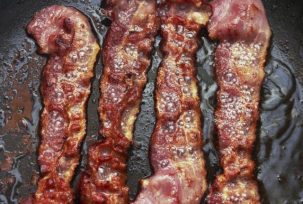What Makes Bacon Smell So Delicious?
As a vegetarian for over 13 years, please excuse me when I say that I hate the smell of bacon; as much as it sounds like heresy, hear me out. I hate the smell of bacon because it smells. so. good. It’s almost a universal constant that the smell of bacon will bring everyone in the house running to the kitchen to get a good long whiff – but why? What is it about cooking bacon that overwhelms the senses and makes mouth water from miles away?

Here’s the short answer to a question that’s kept scientists up at night for decades. It’s all a result of something called the Maillard Reaction. The Maillard Reaction is what it’s called when cooking food begins to brown, and it’s the cause of most of the flavor you experience when eating cooked meat or other foods. Bacon undergoes the Maillard Reaction every time a slab is laid in a hot pan; different foods have different types of Maillard Reactions. For bacon, the sugars in the meat react with amino acids – throw in some melting fats and you’ve got an array of aromas that make you gravitate straight to the kitchen.
To get a little more in-depth, here’s the chemical breakdown of your bacon. The aroma compound released by cooking bacon is composed of about 2/3 hydrocarbons and aldehydes – these are molecules that bond with other molecules in some basic but varied chains. Hydrocarbons and aldehydes can smell heavenly on their own, but what really pulls you in is pyridine, which is a compound that contains nitrogen. It’s pyridine that makes bacon so incredibly aromatic.
The American Chemical Society, in partnership with CompoundChem, has a neat answer to this question, and they break it down for you in this short clip from their Reactions series.
